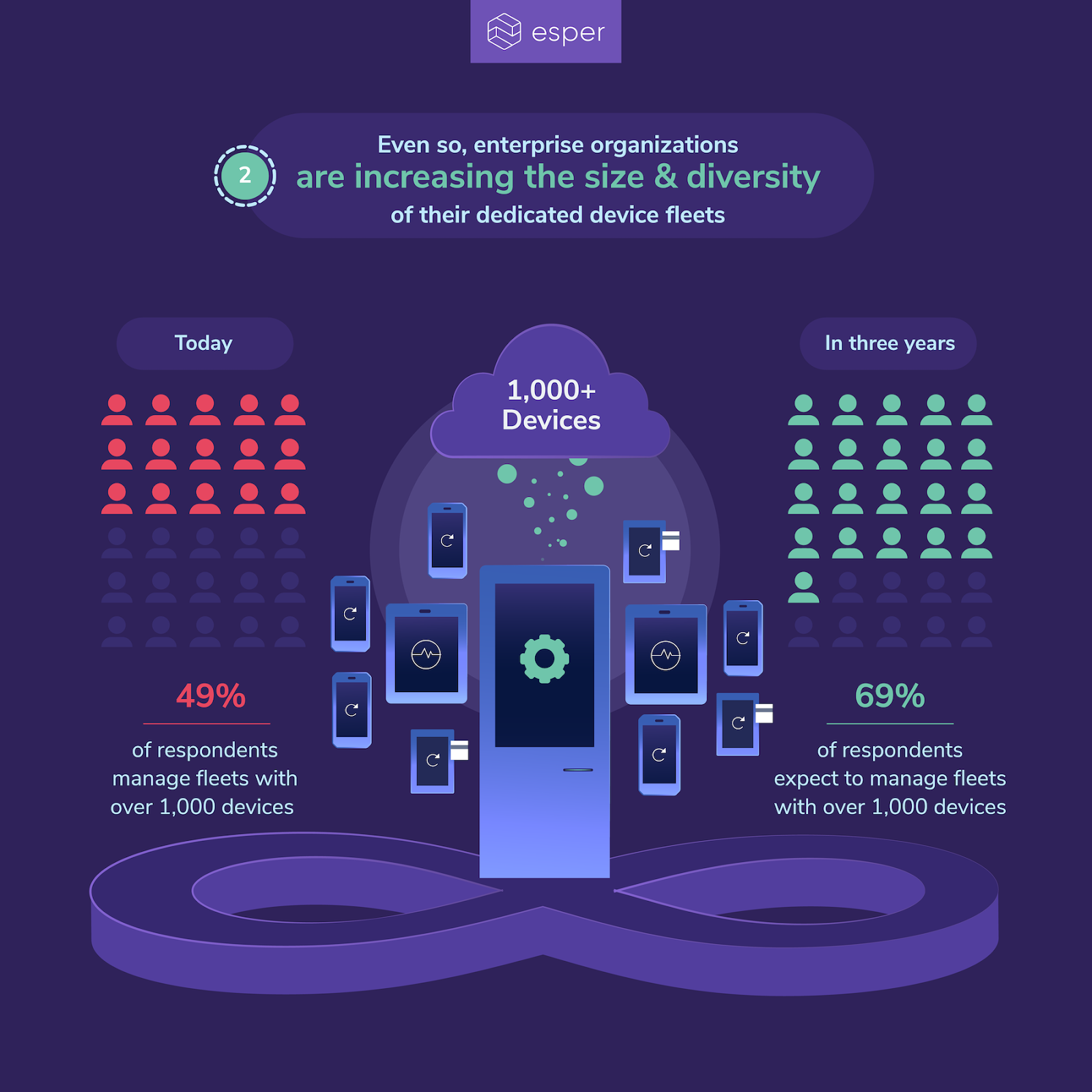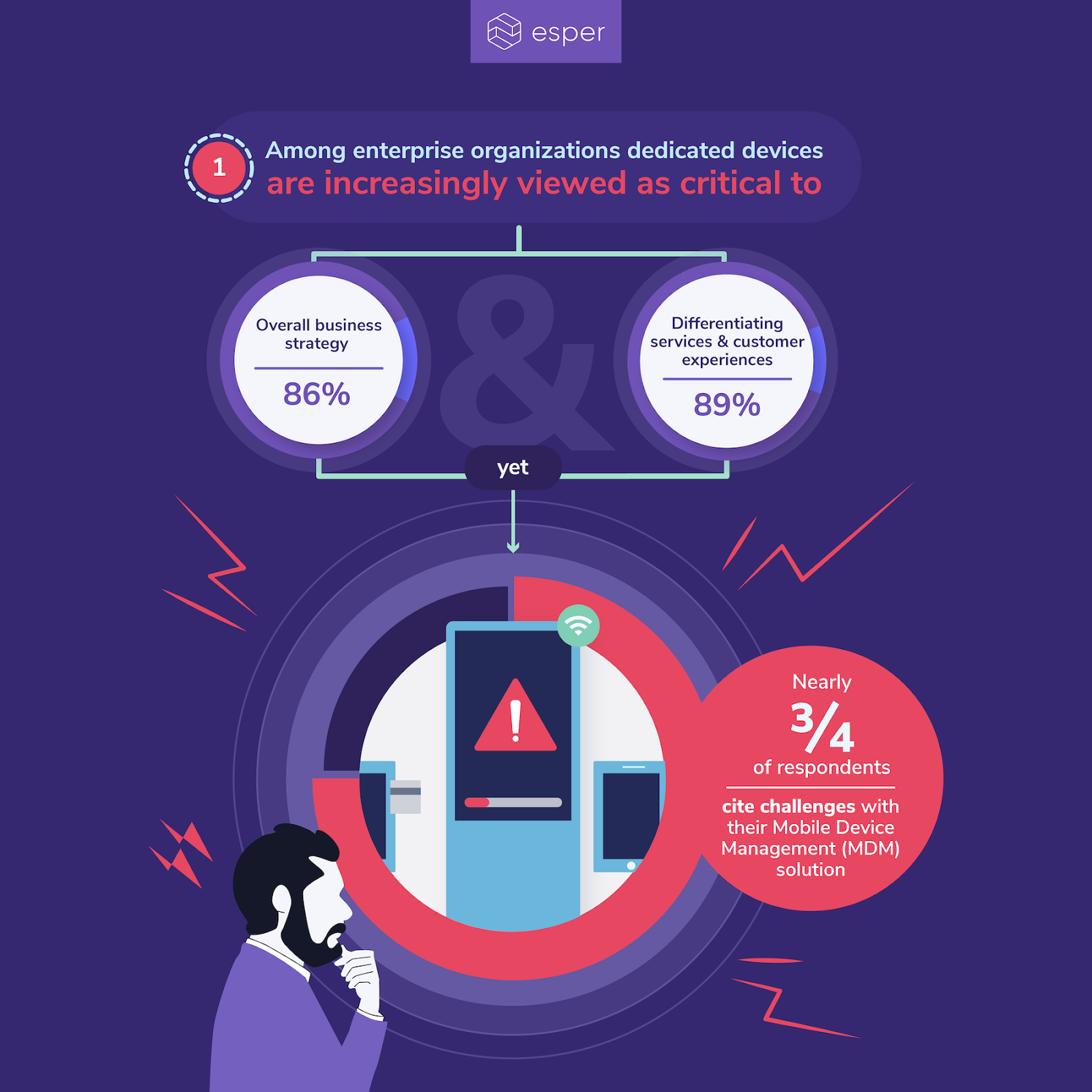When I worked on the Amazon Go store concept, DevOps was the beating heart of everything we did. A lot of the hard work that went into making Amazon Go go was bridging DevOps from the familiar realm of software to include the new aspects of hardware and software interaction.
The experience taught me that you did not need to reinvent the wheel to tame hardware complexities at scale. But you have to be willing to entertain new thinking, new habits, and most importantly, new infrastructure — that’s how Esper came to be. In retrospect, integrated DevOps practices all the way to the edge was inevitable! DevOps transformed every corner of the software development universe, and enterprise-scale device ops is no exception.
This is an excerpt from my book "DevOps for Devices: The Innovator’s Guide to Enterprise Fleet Transformation."
DevOps for devices: Why now?
We’ve seen the rise of cloud DevOps practices and cloud connectivity for devices reach near-ubiquity and change the software landscape in dramatic ways. From mobile apps and SaaS products that have frequent updates to cars that get updates with new features even after they’re driven off the lot, customer demand is higher than ever. And it will continue to rise as digital-native generations become the lion’s share of the population. To continue to thrive, the time is now for enterprises to embrace DevOps for devices.
Esper is the first company to bring the power of DevOps to device fleets, and I gladly spend a lot of my time evangelizing this philosophy to enterprise executives. Getting their devices “working” in the field is just a step on the path to true DevOps maturity — a means to an end. Esper focuses specifically on the devices many companies increasingly depend on for interaction with their customers. The impact is real, measurable, and (in the case of software deployment) immediate.
DevOps transforms how enterprises manage devices
DevOps for devices delivers three key business benefits that share a common root theme: Confidence.
- Reliability. Manual processes done at scale are error prone and slow. DevOps lets you automate batches of update rollouts and can alert and respond to exceptions in real time. You do less, and more gets done (and done safely).
- Repeatability. There is no “done” in device management. Deployments and updates should always advance your goals and deliver maximum business value.
- Robustness. Connected devices are subjected to dynamic environments and require ongoing monitoring and management to ensure device fleets are functioning properly. DevOps can help your device fleet withstand complex and adverse conditions while also allowing devices to be easily and quickly replaced if something goes wrong.
You don’t even have to look to Esper to see customers who are already benefiting from the DevOps for devices phenomenon. Tesla can update its cars over the air, including changes for driver safety or optimizing the available range. Amazon constantly adds new Alexa skills that make it easier and more convenient for customers to intelligently manage and interact with their homes, cars, and offices.
Companies that are taking full advantage of this convergence are being rewarded with highly visible marketplace dominance.
Device performance is crucial to customer experience
Dedicated device fleets are growing rapidly and have been for some time. Devices are already delivering customer interactions, transactions, and experiences — and are a new source of recurring revenue. By 2023, Gartner estimates that there will be 43 billion connected devices in the world, three times as many as in 2018.

Behind this explosive growth are dynamics like Moore’s Law, hardware commoditization, and innovative device form factors that can reach customers in contexts previously found only in science fiction. These continued advances in technology (and drastically lower costs) mean virtually anything can become a connected device: bicycles, watches, self ordering kiosks, televisions, industrial machines, point-of-sale systems, cars, inventory scanners — the list goes on as far as your imagination can take it. Dedicated devices open doors to new use cases available for any company to deliver innovative customer experiences and generate new revenue streams.
This actually might be the most significant benefit of DevOps for dedicated devices: planned obsolescence becomes a thing of the past. Instead, in line with demands for environmental sustainability and other consumer preferences, companies are moving to subscription models where the product constantly improves even though the hardware remains the same.
And subscription-based services are exactly what modern consumers are asking for. A 2021 Zuora study found nearly two-thirds of customers choose subscriptions to feel “connected” to brands in the age of self-service. These subscriptions provide continuous personalization that improves over time, building an ongoing connection with a customer that extends far beyond an individual transaction. In the age of subscription models and recurring revenue, devices are mission critical to delivering those experiences.
Esper partnered with 451 Research to validate this assumption. 89% of companies we surveyed consider their dedicated device fleets a critical tool for differentiating their services and customer experiences. For example, innovative hotels and entertainment venues are introducing personalized experiences, exclusive access with subscriptions, and member rewards. Smart fitness brands stand out through curated content and gamifying progress over time. Retailers are offering immersive experiences and personalized subscription programs that connect the brand from home to their brick-and-mortar stores.
To stay competitive, enterprises need to innovate on their customer experience quickly and often. The 451 Research survey revealed an awareness that delivering exceptional customer experiences at speed and scale requires new thinking:
- 57% of respondents want a DevOps-based solution to help speed up time to market for new services and improvements
- 55% say they will use DevOps to help improve the user experience of apps and services.
Managing devices isn’t easy, and hardware is hard. As a result, brands are rethinking their approaches to deploying, updating, and monitoring device fleets at the edge — placing DevOps at the center of their action plans.
You’re competing in the age of dedicated devices, but your tools aren’t
Esper was born from the realization that the “best” option for device fleet management, Mobile Device Management (MDM) software, just doesn’t do the job that organizations need it to do. MDM platforms were built to address the Bring Your Own Device (BYOD) reality of smartphones and other mobile devices inside many large companies. To maintain any semblance of security in an environment where corporate data lived on employees’ personal devices, IT teams needed help. Thus, MDM was born.

But MDM tools were never intended as a solution for dedicated device fleets. The MDM DNA is to protect the company from employee devices. In the MDM paradigm, the company is first and the device is second. When it comes to dedicated devices, the devices are mission critical to the business strategy. The device, in essence, is the company. Whether it is a self-service kiosk, digital signage, a forklift, or an exercise bike, these are the primary methods of interaction between customers and companies.
When customers (internal or external) rely on these dedicated devices to function properly and securely, that’s what DevOps for devices is for. As a result, any tool comparison between MDM and DevOps for devices is apples to oranges:
- Always-connected, mission critical systems like point of sale, kiosks, and digital signage can’t be effectively managed using BYOD tools (read: traditional MDM). These tools cannot effectively deploy, control, or update dedicated devices individually, much less at enterprise scale.
- Just because a dedicated device looks like a consumer smartphone or tablet doesn’t mean it can be managed like one. DevOps-based solutions with APIs, SDKs, and OS savvy are needed to deploy, monitor, and update real fleets at real scale.
A traditional MDM’s comparatively simplistic solutions aren’t up to the task of managing mission-critical devices. If building exceptionally reliable and consistent experiences to your customers matters, frequent updates matter. Continuous improvement matters. Robust remote connectivity matters. Modern device strategies hinge on truly rapid iteration to ensure you’re always delivering the best possible customer experience.
Many dedicated device fleets struggle to meet even quarterly software release cycles — DevOps can enable weekly, daily, or even hourly deployment cycles. The competitive advantages of such a shift speak for themselves.
